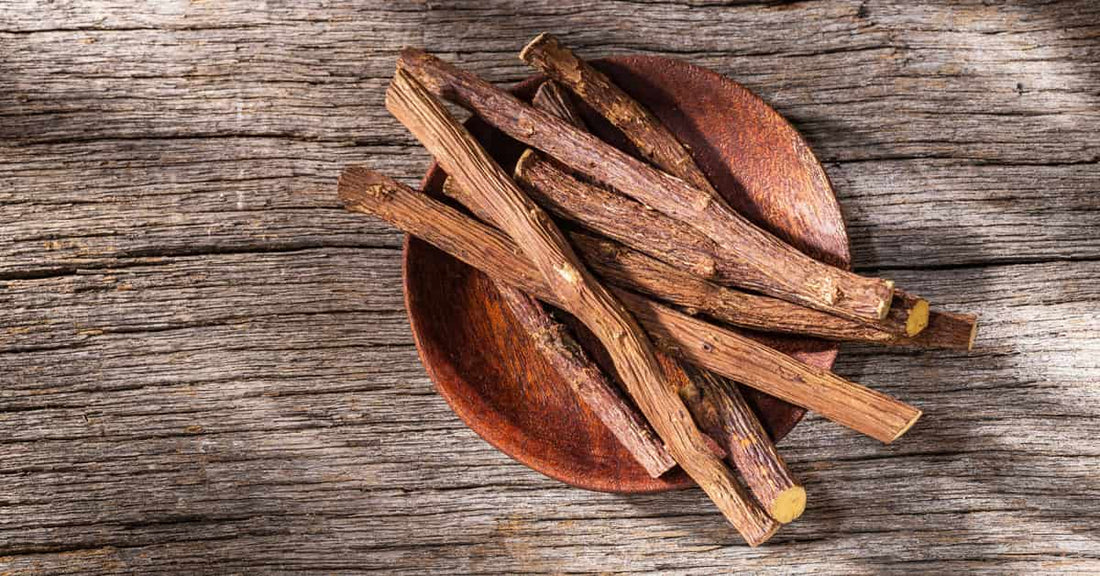THERAPEUTICS OF LICORICE-THE HERB
In Ayurvedic healing, licorice enjoys a special place of regard as a Rasayana—a special class of anti-aging herbs that promote longevity, nourish and rejuvenate all seven tissues, strengthen the body’s natural defenses, and replenish vital energies.
Alleviates Respiratory Infections
Licorice is best known for its immune-boosting and respiratory benefits. Ayurvedic texts describe it as a natural demulcent and expectorant that moisturizes mucous membranes, soothes the upper respiratory tract, strengthens and nourishes lungs, eases congestions, and supports optimal breathing.
Licorice root extracts are commonly used in cough syrups and herbal formulations for alleviating symptoms of bronchitis, asthma, excessive coughing, common cold, sore throat, sinusitis, allergic rhinitis, and respiratory tract infections. Respiratory issues are considered manifestations of aggravated vata and kapha. Licorice balances vata dosha and expels excess kapha from the lungs.
Soothes Upset Stomach
Sipping sweet licorice tea is an age-old way to relieve digestive discomforts like hyperacidity, acid reflux, dyspepsia, bloating, heartburn, constipation, diarrhea, and abdominal cramps.
Ayurveda recognizes digestion as the key to perfect health and emotional well-being. The quality of your digestion depends on the strength of your digestive flame (agni), which can be understood as a form of metabolic energy that regulates processes like food breakdown, secretion of gastric juices, and nutrient assimilation.
A weak flame may result in incomplete digestion and accumulation of toxins over time, whereas an overactive flame can cause excess stomach acidity and nutrient loss. The cooling potency of licorice helps maintain optimal agni and promotes peaceful digestion.
In numerous clinical trials, licorice extracts have been reported to improve symptoms of chronic functional dyspepsia and gastrointestinal reflux disease (GERD). Researchers have found that phytochemicals present in this herb can suppress gastrin production, which is a hormone responsible for secreting stomach acids. Increased gastrin production is a well-known side effect of antacids and heartburn medicines, which can lead to frequent digestive problems and ulcer formation. Licorice, on the other hand, is a relatively safer option.
Improves Gut Health
The gut health benefits of licorice are in no way limited to minor tummy troubles. It also works as an excellent prebiotic, enhances mucosal barrier function, soothes gut inflammation, and helps repair intestinal linings. Evidence suggests that flavonoids found in licorice roots can promote the growth of friendly gut bacteria, kill harmful germs and parasites, and restore microbiota balance. A healthy gut microbiome plays a crucial role in preventing metabolic disorders like obesity, type-2 diabetes, kidney disease, and cardiovascular diseases.
In addition, licorice root is also known to control the growth of various opportunistic microbes that become problematic when you are recovering from an illness, including Staphylococcus aureus, E. coli, Candida albicans, and Helicobacter pylori. In one study, combining licorice with antibiotic treatment successfully eradicated H. pylori bacteria, which causes peptic ulcers and is difficult to treat with conventional drugs alone.
Deglycyrrhizinated licorice (DGL) supplements have been shown to protect the digestive tract from damage and improve gastrointestinal conditions like gastric ulcers, ulcerative colitis, inflammatory bowel disease, Crohn’s disease, celiac disease, and IBS.
Enhances Ojas
According to ayurvedic philosophy, your immunity, strength, vitality, endurance, energy levels, and emotional resilience are all dependent on the strength of your ojas, which is the vital fluid of life and the core essence of all body tissues.
Ojas is the primal energy reserve of the body and mind that comes from rich, sattvic foods and proper digestion. It gives strength to tissues, brings peace and joy, improves skin luster, and protects from external factors. Licorice is rich in prana (life energy) and has rejuvenating, calming, and deep nourishing nature that can help build this subtle form of Kapha and protect it from depletion and loss.
An Excellent Brain Tonic
Licorice is described as a Medhya Rasayana (rejuvenating for the brain) in Ayurveda, which is a unique category of four nootropic herbs that promote brain health and improve cognition, memory, intellect, and mental clarity.
Studies have shown that licorice improves blood circulation to the brain’s hippocampus region, protects brain cells from oxidative damage, and strengthens the nervous system. It is also a well-known adaptogen that helps manage chronic stress and adrenal fatigue.
Natural Sleep Aid
Evidence suggests drinking licorice tea before bed can help decrease sleep onset time and improve sleep quality. Licorice contains a flavonoid called glabrol, which binds with GABA receptors in the brain, a chemical messenger that allows rest and relaxation.
In one study, taking licorice supplements before bed increased the duration of slow-wave sleep, which is considered the deepest stage of sleep and plays a key role in tissue healing and energy restoration.
Repairs and Rejuvenates the Skin
In addition to nourishing your skin and body from deep within, licorice also works as an excellent emollient and skin vitalizer. It has been used for centuries in homemade face packs to boost skin hydration, remove pigmentation spots, promote cell turnover, and improve wound healing.
When applied topically to the skin, its antiseptic and anti-inflammatory properties can soothe redness, itching, swelling, and pain from skin infections. Numerous studies have found topical treatment with licorice helpful in eczema, rosacea, psoriasis, and allergic skin conditions. In a 2020 study, combining oral licorice supplements with conventional treatments significantly reduced the frequency and severity of eczema flare-ups.

